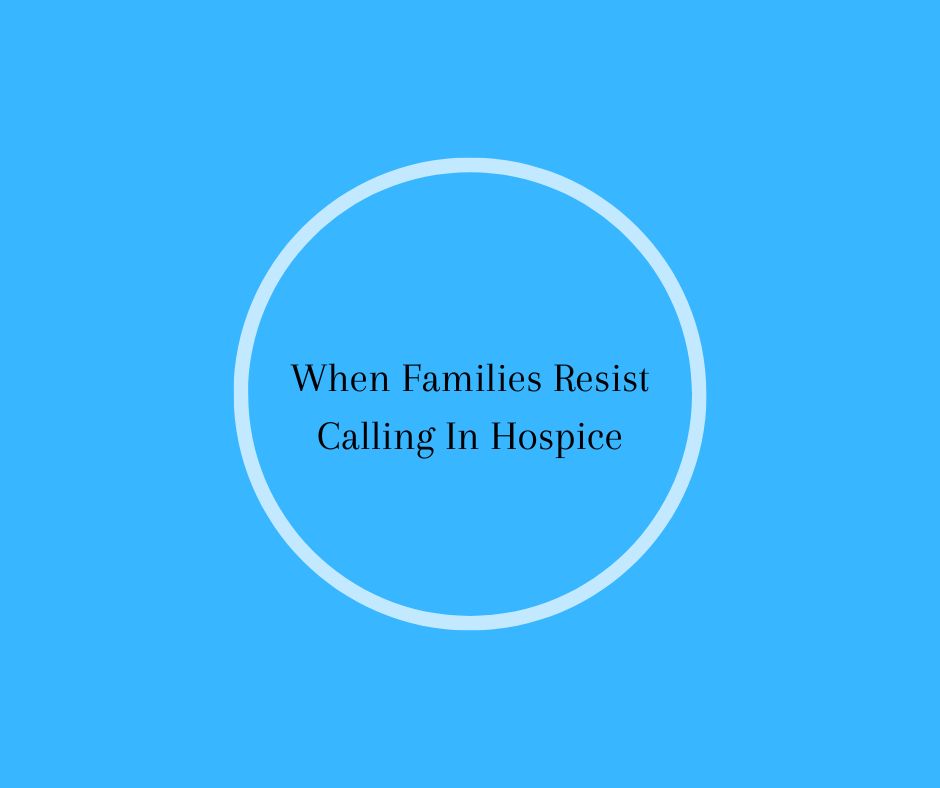Dear Barbara,
How does a person feel as a hospice patient? Everyone is waiting on them, they are unable to do things for themselves. They have to wear diapers and probably don't want to be a problem for caregivers. Often, their well-meaning loved ones stay for long visits when they want to rest.
I don’t think there is a “one size fits all” answer here. I can only guess, not having been in that situation yet. What stands out for me is that whether we are facing the end of our life or have a serious illness or some sort of debilitation, how we react and respond is going to be according to our personality. It is going to be how we have faced other challenges and life situations.
Challenging life situations generally don’t change how we react or respond to others. Our personality traits are mostly just intensified.
So — if I am a very private person, I will probably have a challenge accepting all of the attention. If I’m an extrovert, then interacting with others can be helpful. You see where I am going with this. Look at the person, their personality, how they would react if they were well and that is probably what they are thinking and how they would want to be treated now. But even more so.
The one way of addressing these questions in the months before death is to ask, How do you feel about all this company? Do you want to talk about all the changes that are occurring? It is important to give the person as much control over their living, their wants, their idea of comfort as possible within the circumstances of their inabilities. And that requires talking about the changes and how their life is unfolding.
The above applies to people before their labor begins. Once they are weeks from death, this world and its activities, its protocols, its people, and its interactions lose their importance. The focus is now on leaving.
The person is sleeping most of the time and seems confused and “other worldly.” I don’t think they are thinking about themselves or what their wants or needs are.
Something More… about Slipping Into the Shoes of a Hospice Patient
The more the caregiver knows what to expect during the dying process of their special person, the more calm and sacred the months, weeks and days will be for everyone. Having the end of life guideline series bundle at the bedside for caregivers, friends and visitors to read and refer to will be a huge help.







3 comments
Karen
Thank you so much for providing this information. I’ve been a fan and follower for years, Barbara…and now I’m going through the process with my dad. He was suddenly diagnosed with stage 4 pancreatic cancer. I’ve printed this up for my mom to read and will be sharing ALL your books with her and we walk this new journey. Grateful to have a wonderful hospice on board and you as our coach. Thank you for ALL you do. We are so grateful.
———
BK Books replied:
Hi Karen, my thoughts are with you and your family as you live this new challenge. If I can be of help, email me at barbara@bkbooks.com. I don’t do the phone but will certainly answer any questions you may have. Blessings! Barbara
Thank you so much for providing this information. I’ve been a fan and follower for years, Barbara…and now I’m going through the process with my dad. He was suddenly diagnosed with stage 4 pancreatic cancer. I’ve printed this up for my mom to read and will be sharing ALL your books with her and we walk this new journey. Grateful to have a wonderful hospice on board and you as our coach. Thank you for ALL you do. We are so grateful.
———
BK Books replied:
Hi Karen, my thoughts are with you and your family as you live this new challenge. If I can be of help, email me at barbara@bkbooks.com. I don’t do the phone but will certainly answer any questions you may have. Blessings! Barbara
Lori Martin
Is this newsletter you’re offering something different than what was sent to get to this page? (Your paragraphs describing your booklets? If so then, yes please sign me up 😃
———
BK Books replied:
Lori, I’m not sure what you are referring to. If you received this blog then you are probably on our blog mailing list. If someone forwarded it to you then go to bkbooks.com and subscribe to the blog. Blessing! Barbara
Is this newsletter you’re offering something different than what was sent to get to this page? (Your paragraphs describing your booklets? If so then, yes please sign me up 😃
———
BK Books replied:
Lori, I’m not sure what you are referring to. If you received this blog then you are probably on our blog mailing list. If someone forwarded it to you then go to bkbooks.com and subscribe to the blog. Blessing! Barbara
Mary
My dad has dementia. Asking questions distresses him. Would it work to say something like: Tell me if there is anything comforting I can do.
———
BK Books replied:
Hi Mary, Yes, asking him if there is anything comforting you can do for him is very non threatening. You could even leave out the word “comforting”. The thing with dementia is the next time you visit all may have been forgotten. Try to find where he is at a given movement and support him there. That may be the comfort you can give him. He probably can’t tell you what he wants or even needs. “Don’t ask, do” is a good motto for working with dementia. Blessings to you and your dad Barbara
My dad has dementia. Asking questions distresses him. Would it work to say something like: Tell me if there is anything comforting I can do.
———
BK Books replied:
Hi Mary, Yes, asking him if there is anything comforting you can do for him is very non threatening. You could even leave out the word “comforting”. The thing with dementia is the next time you visit all may have been forgotten. Try to find where he is at a given movement and support him there. That may be the comfort you can give him. He probably can’t tell you what he wants or even needs. “Don’t ask, do” is a good motto for working with dementia. Blessings to you and your dad Barbara